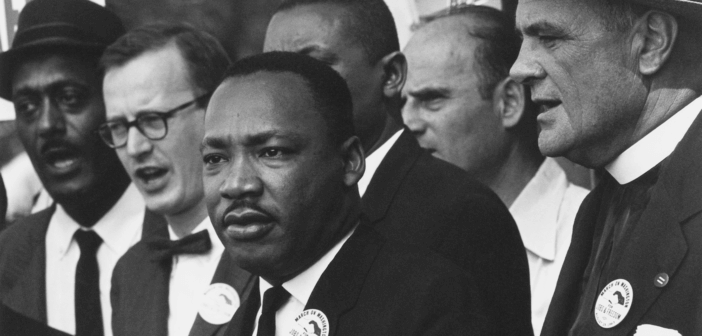C. Anthony Hunt identifies 10 features of the Beloved Community in the work of Martin Luther King Jr. He describes how King’s concept of Beloved Community, rooted in the biblical notion of God’s unconditional love, connects faith to action.
Rev. Dr. Martin Luther King Jr.’s singular vision was for the realization of the Beloved Community. King’s perspective on the Christian love ethic provides critical insight into understanding his persistent search for the Beloved Community. For King, it was rooted in the biblical notion of agape (God’s unconditional love) and was the ultimate goal for society.
In King’s conception of the Beloved Community, faith and action were interrelated. In this regard, theology and ethics were inextricably connected. Theology—what we believe and comprehend about God (how we talk about God), could not be separated from ethics—how we act and relate as a human family. Our creed and our deed have to be in concert. Our talk and our walk have to correspond. This faith-action (creed-deed) dialectic found its ultimate expression in the notion of the Beloved Community.
In the work of Martin Luther King Jr., at least ten features of the Beloved Community can be identified.
1. Beloved Community is rooted in the biblical notion of agape love.
God’s unconditional love is the ultimate goal for the world (creation). According to Martin Luther King Jr., it is the love of God operating in the human heart, and seeks to “preserve and create community.”
2. In the Beloved Community, power is always to be expressed within the context of love.
According to King, “Power without love is reckless and abusive, and love without power is sentimental and anemic. Power at its best is love implementing the demands of justice, and justice at its best is power correcting everything that stands against love.”
3. Beloved Community recognizes and honors the image of God in every human being.
It understands everybody as somebody, and offers radical hospitality to everyone as a part of an inclusive family, the world house. It exhibits true respect and validation of others.
4. Beloved Community seeks peace with justice.
Beloved Community righteously opposes oppression and injustice, and takes direct action against racism, poverty, and violence. Peace is always to be connected with justice. King stated that “true peace is not merely the absence of tension; true peace is the presence of justice.”
5. Beloved Community affirms the efficacy of soul force.
King believed in the Gandhian principle of Satyagraha (soul force) as the most effective way to enact real change in human hearts and society. King stated, “We must rise to the majestic heights of meeting physical force with soul force (Satyagraha).”
6. In the Beloved Community, faith and action are interrelated.
Theology and ethics are inextricably connected. Theology—what we believe and comprehend about God (how we talk about God), cannot be separated from ethics—how we behave and relate as a human family. Our creed and our deed have to be in concert, and our talk and our walk have to align.
7. Beloved Community affirms that all of humanity is a part of an inescapable network of mutuality.
King stated that “all life is interrelated.” One of his fundamental beliefs was in the kinship of all persons. He believed that all of life is part of a single process; all living things are interrelated, and all persons are sisters and brothers. All of us have a place in the Beloved Community. Because all of us are interrelated, one cannot harm another without harming oneself.
8. Beloved Community insists on interdependence as the impetus toward the realization of full humanity and the actualization of full community.
As first posited by the likes of Josiah Royce, then Howard Thurman, Martin Luther King Jr., and Desmond Tutu, it is in and through the Beloved Community that persons discover themselves, and experience the meaning of living together as the family of God.
9. Beloved Community depends on the collaborative effort of cross-sections of people with common interests for a just society.
The sentiments of King’s friend Rabbi Abraham Joshua Heschel resonate, “Morally speaking, there is no limit to the concern one must feel for the suffering of human beings; indifference to evil is worse than evil itself, and in a free society, some are guilty, but all are responsible.” South African Archbishop Desmond Tutu stated, “If you are neutral in situations of injustice, you have chosen the side of the oppressor.” Similarly, German theologian Dietrich Bonhoeffer intimated that (for all of us), “not to speak is to speak is to speak and not to act is to act.”
10. Beloved Community seeks to build increasing levels of trust among people across differences.
It works to overcome the fear of difference and fear of others through authentic human engagement and a striving toward community-building and peacemaking.
Adapted from Redeeming the Dream: Essays and Other Writings on Martin Luther King Jr. and Social Justice (Wyndham Hall Press, 2023) by C. Anthony Hunt. Used by permission. The book is available at Amazon.
Related Resources
- Ten Ways to Build the Beloved Community by Tony Hunt
- Martin Luther King Jr.’s 4 Key Principles of Prophetic Witness by Tony Hunt
- What Would Martin Luther King Jr. Say to the Church Today? by Tony Hunt
Photo by Rowland Scherman/Adam Cuerden — U.S. National Archives and Records Administration, Public Domain






